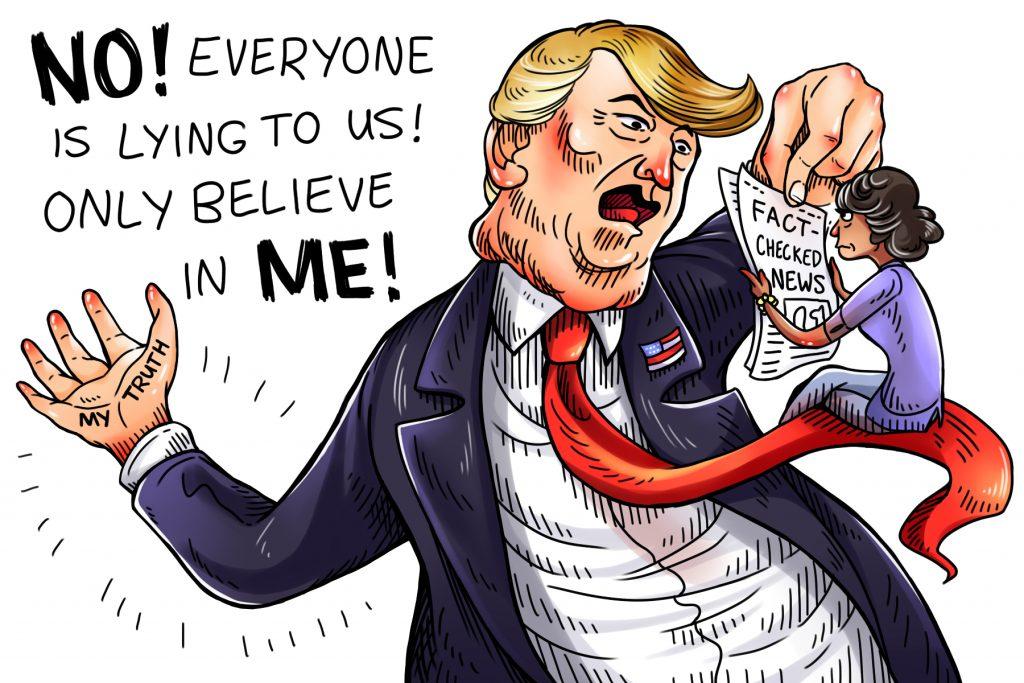Political candidates and pundits begin to rely more on appearances than truth in U.S. elections.
By Nicholas Bostick
Multimedia Editor-at-Large

Fact checking is a relatively simple process. Statements from public figures and sources are corroborated by other individuals and measured against hard data.
The thought of millions of voting Americans seeing this process as biased is at best amusingly paradoxical and, at worst, could irreparably damage journalists’ ability to serve their primary function: informing the public.
In 2012, a political ad endorsing then Republican presidential candidate Mitt Romney falsely accused his opponent, President Barack Obama, of eliminating work and job training requirements for welfare beneficiaries via an executive order.
This accusation was proven false by a reporter from The Atlantic. According to a front page article in The New York Times, Romney aides at the time alleged that the GOP candidate’s statement regarding Obama rallied the working class to vote for Romney. “Fact checkers come to this with their own sets of thoughts and beliefs, and we’re not going to let our campaign be dictated by fact checkers,” Neil Newhouse, a Romney pollster, said.
Unfortunately, it doesn’t take long to realize damage has already been done. One only has to turn on the radio to hear the likes of Rush Limbaugh, a conservative political commentator, deride the virtues of common sense and truth to nearly 13 million listeners every week, according to Politico.
“The fact that The New York Times, and The Washington Post, and USA Today and all these other papers and networks now have fact checkers is for one reason,” Limbaugh said on the Sept. 28 edition of “The Rush Limbaugh Show.”
“The idea that it is a fact check story is designed to say to you that it is objective and analytically fair, and all it is is a vehicle for them to do opinion journalism under the guise of fairness. Which, if you fall for it, gives it even more power,” Limbaugh continued.
The New York Times, The Washington Post and USA Today have always had fact checkers and opinion pages. And while media bias has been known to rear its head on both sides of the red and blue divide, comments like Limbaugh’s are appearing more regularly and affecting American politics more drastically than ever.
As millions of Americans hear similar statements made by new journalism websites, political pundits and in the social media posts of sycophantical supporters of either side, it’s easy to see why Donald Trump, a man PolitiFact reported has lied in 72 percent of his statements, is currently in the running to become our next president.
His supporters, like Romney’s, refuse to let little things like facts get in the way, because as “This American Life” host Ira Glass said in the 599th episode of his radio show, politics is an identity.
“You know you’re a Republican or you’re a Democrat, and then there’s a whole set of stories and beliefs that go with that identity,” Glass said. “Facts do not have much power against a set of beliefs. Those of us in the fact business – our facts are puny compared to that.”
For transparency’s sake, I do not personally subscribe to either major party and I don’t mean to beat up on Trump.
At least Trump was elected by way of his own rhetoric instead of being pushed to the top by his party as Hillary Clinton apparently was, according to leaked emails.
Those emails include proof that Debbie Wasserman Schultz, former Democratic National Committee chair, and her staff actively planned to undermine Bernie Sanders’ campaign.
“Wondering if there’s a good Bernie narrative for a story, which is that Bernie never ever had his act together, that his campaign was a mess,” Mark Paustenbach, DNC national press secretary, wrote in an email to DNC national communications director, Luis Miranda.
Clinton herself knowingly lied about transmitting classified information through an unauthorized and unsecured email server. According to PolitiFact, Clinton said she did not have classified information on her server. However, the FBI’s investigation found that 113 emails contained classified information.
These are major issues that would normally cripple a candidate’s campaign, but supporters are willing to ignore these facts for the sake of protecting their ideals.
The same goes for Trump, who has his own laundry list of controversies and, as of press date, is still very much in the running.
But the fact remains, objectivity and accuracy are not the latest trends in journalism. And in the age of information we live in, when all one needs is a smartphone to prove or disprove nearly any claim made by a politician, it seems that perception has trumped reality


